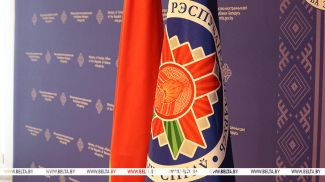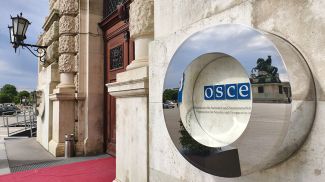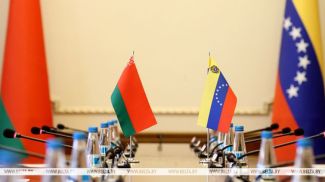
MINSK, 15 January (BelTA) – The objective historical process has brought the SCO and BRICS to the forefront, Olga Lazorkina, an analyst with the Belarusian Institute of Strategic Research (BISR), told BelTA as she commented on the approval by the head of state of the strategies of Belarus' participation in the SCO and BRICS.
The strategy of Belarus' participation in the SCO defines the conceptual areas of activity, goals and objectives of Belarus' participation in the SCO and mechanisms for their implementation in the near and medium term. The strategy, which deals with BRICS, also defines the priority areas of Belarus's interaction with the member states and partner states of this group. Both strategies are designed to run for five years until 2030.
The BISR analyst drew attention to the following: “in the context of a new highly competitive geopolitical environment, international regional associations are turning into an important tool for maintaining the stability of the global system. The objective historical process has brought the SCO and BRICS to the forefront. These associations operate on the principle, which is badly needed in the world today: they do not set additional conditions for cooperation and mutual assistance and do not seek to dictate their will to other states.
She also continued: “Security and development, development through security - the slogan that unites the SCO and BRICS. It is this formula that meets the expectations of the majority and creates a new quality of integration based on the synergy of trends and expectations. This is why the role of these integration associations in international relations is growing manifold, which is confirmed by their rapid expansion.
Olga Lazorkina emphasized: “Belarus, like many other countries, welcomes the open nature of the SCO and BRICS. The history of relations with these associations and member countries has allowed our country to take part in the development of the principles underlying them”.
She touched upon the historical perspective: “The SCO, which was established in 2001 through the efforts of China, Russia, Kazakhstan, Tajikistan, Kyrgyzstan and Uzbekistan, has been a natural partner for Belarus from the very beginning. Belarus has developed relations of alliance and partnership with all the founding countries. China and Russia hold a special place in Belarus' foreign policy, with which the country has built consistent strategic relations.”
“Belarus has gained tremendous experience in the SCO thanks to the status of a dialogue partner and an observer. Therefore, the admission of Belarus to the organization as a full member in 2024 was a high assessment of our country's efforts and contribution to the common cause of the SCO family,” the analyst noted.
“Along with the SCO, key allies and partners of Belarus were forming the BRICS international association, which was supposed to launch the process of rethinking the approaches to the global economic system,” she continued. “Already in 2006 it was obvious that this system did not allow most countries to build long-term development strategies because it benefited only a limited number of states. At the beginning of its formation, the BRICS five never imagined that they would have to face such challenges and that this platform would become a key one for shaping a unifying agenda.
Olga Lazorkina also expressed her opinion: “Today, BRICS is expected to create a success story for the international community. It is important for the leaders of the states to form not an alternative, but a parallel economic, ideological, cultural and humanitarian reality that would allow for a full-fledged dialogue and maintain sustainability in any conditions”.
“Such approaches and trends are fully in sync with the philosophy of integration and meet the principles of our country's foreign policy,” Olga Lazorkina said.
The strategy of Belarus' participation in the SCO defines the conceptual areas of activity, goals and objectives of Belarus' participation in the SCO and mechanisms for their implementation in the near and medium term. The strategy, which deals with BRICS, also defines the priority areas of Belarus's interaction with the member states and partner states of this group. Both strategies are designed to run for five years until 2030.
The BISR analyst drew attention to the following: “in the context of a new highly competitive geopolitical environment, international regional associations are turning into an important tool for maintaining the stability of the global system. The objective historical process has brought the SCO and BRICS to the forefront. These associations operate on the principle, which is badly needed in the world today: they do not set additional conditions for cooperation and mutual assistance and do not seek to dictate their will to other states.
She also continued: “Security and development, development through security - the slogan that unites the SCO and BRICS. It is this formula that meets the expectations of the majority and creates a new quality of integration based on the synergy of trends and expectations. This is why the role of these integration associations in international relations is growing manifold, which is confirmed by their rapid expansion.
Olga Lazorkina emphasized: “Belarus, like many other countries, welcomes the open nature of the SCO and BRICS. The history of relations with these associations and member countries has allowed our country to take part in the development of the principles underlying them”.
She touched upon the historical perspective: “The SCO, which was established in 2001 through the efforts of China, Russia, Kazakhstan, Tajikistan, Kyrgyzstan and Uzbekistan, has been a natural partner for Belarus from the very beginning. Belarus has developed relations of alliance and partnership with all the founding countries. China and Russia hold a special place in Belarus' foreign policy, with which the country has built consistent strategic relations.”
“Belarus has gained tremendous experience in the SCO thanks to the status of a dialogue partner and an observer. Therefore, the admission of Belarus to the organization as a full member in 2024 was a high assessment of our country's efforts and contribution to the common cause of the SCO family,” the analyst noted.
“Along with the SCO, key allies and partners of Belarus were forming the BRICS international association, which was supposed to launch the process of rethinking the approaches to the global economic system,” she continued. “Already in 2006 it was obvious that this system did not allow most countries to build long-term development strategies because it benefited only a limited number of states. At the beginning of its formation, the BRICS five never imagined that they would have to face such challenges and that this platform would become a key one for shaping a unifying agenda.
Olga Lazorkina also expressed her opinion: “Today, BRICS is expected to create a success story for the international community. It is important for the leaders of the states to form not an alternative, but a parallel economic, ideological, cultural and humanitarian reality that would allow for a full-fledged dialogue and maintain sustainability in any conditions”.
“Such approaches and trends are fully in sync with the philosophy of integration and meet the principles of our country's foreign policy,” Olga Lazorkina said.













